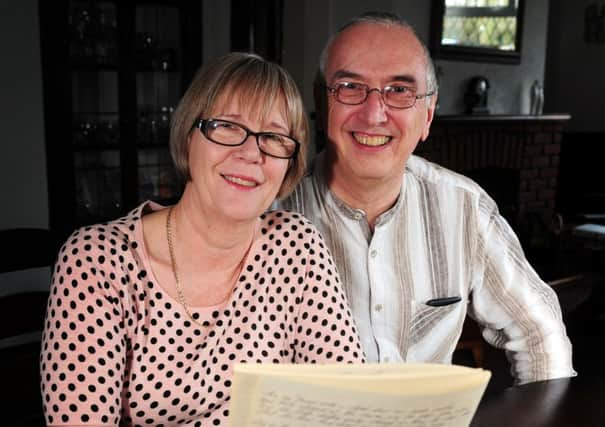War hero’s journey ends with a poetic farewell


He spent the following three years as a prisoner of war before eventually returning to his family in Britain.
But he spoke little about his experiences – that is until he faced innocent but persistent questioning from his four-year-old great grandson Charlie and finally opened up about his experiences.
Advertisement
Hide AdAdvertisement
Hide AdYet following his death at the age of 93 last month, his family discovered another side to his life as a prisoner in a cache of war poems.
The works were originally completed on sacking – paper being a scarce luxury for the prisoners – but he had later transposed them onto paper and it was these which were found by his family in a drawer of private memorabilia at his Selby home that no one else had been allowed to touch or look at.
His daughter Julie Ward said of her father and her grandson Charlie: “They had a special bond and Maurice told him what he wanted to know. Charlie was like a switch. He then spoke to everyone.”
Thanks to Charlie’s questions, Mr Crowther began talking about events that led to him writing the poems, giving the family the context for the work they would later find.
Advertisement
Hide AdAdvertisement
Hide AdHe had enlisted aged 19 with his best friend Norman Wood in August 1939, unaware war would begin barely two weeks later.
They set sail for Singapore aboard RMS Empress of Japan (renamed Empress of Scotland once Japan attacked British outposts). But what initially seemed like a ‘soft’ posting turned into a nightmare.
Japanese troops invaded Singapore on February 8, 1942 and Allied forces surrendered a week later, the largest surrender of British-led forces in history.
On the eve of the Fall of Singapore, he headed to the famous Raffles Hotel in a desperate search for more ammunition.
Advertisement
Hide AdAdvertisement
Hide AdMr Crowther resisted capture until the bitter end, refusing to surrender as he backed away from Japanese soldiers into the sea. He was taken prisoner, but found his defiance had earned him a level of respect among his Japanese captors.
Mr Wood also survived the battle and both were imprisoned in Singapore’s Changi Prison.
Stephen Ward recalls his father-in-law’s account of “the surprising amount of freedom” they enjoyed at Changi. As an island, Singapore formed a natural prison, and PoWs were free to walk into town.
While in Changi, he used poetry as a way to record his experience. “Grasping, groaning, crying, moaning is this nature in the raw?/No! It’s simply ‘Bloody Murder’, in history books they call it war,” he wrote in The Battle of Singapore.
Advertisement
Hide AdAdvertisement
Hide AdMalaria separated the two pals and ultimately saved Mr Crowther’s life. While he was in hospital in Singapore, Mr Wood was shipped off to work on the Siam-Burma Death Railway, an experience he did not survive.
His friend was instead sent on Japanese ‘hell ship’ Fukai Maru to Jinsen PoW camp in Korea. There he reflected on the loss of his comrades in The Fall of Singapore.
Mr Crowther was moved again to Fukuoka until the end of the war. He was forced to labour in the salt mines and suffered a broken leg. But he recounted lighter stories, too.
While a prisoner, a Japanese soldier heard he had boxed for the Army. Keen to learn, he sought him out for a daily lesson.
Advertisement
Hide AdAdvertisement
Hide Ad“Maurice would knock seven bells out of him – with permission!” recounted Mr Ward.
The bombing of Nagasaki set Mr Crowther free, though it would take him another six months to get home via Canada. It was a delay he was glad of, since he did not want his family to see him as he was when he left the camp.
Mr and Mrs Ward took him back to Singapore in 2012, to revisit his memories – although when they went to Raffles this time it was just for tea.
The family now hopes to lodge the poetry with the Far East PoW Memorial at the National Memorial Aboretum where they also plan to dedicate a tree, in part because Mr Crowther and his family felt there was too little recognition of soldiers who fought in the Far East.
Advertisement
Hide AdAdvertisement
Hide Ad“They didn’t die for nothing did they?” asked Mr Crowther, who called his regiment the ‘Forgotten Regiment’. His family hopes his account will live on as part of the memorial.
Mrs Ward said poetry played one last touching role in her father’s life. “Stephen wrote a poem for his eulogy – my father went out with poetry,” she added.